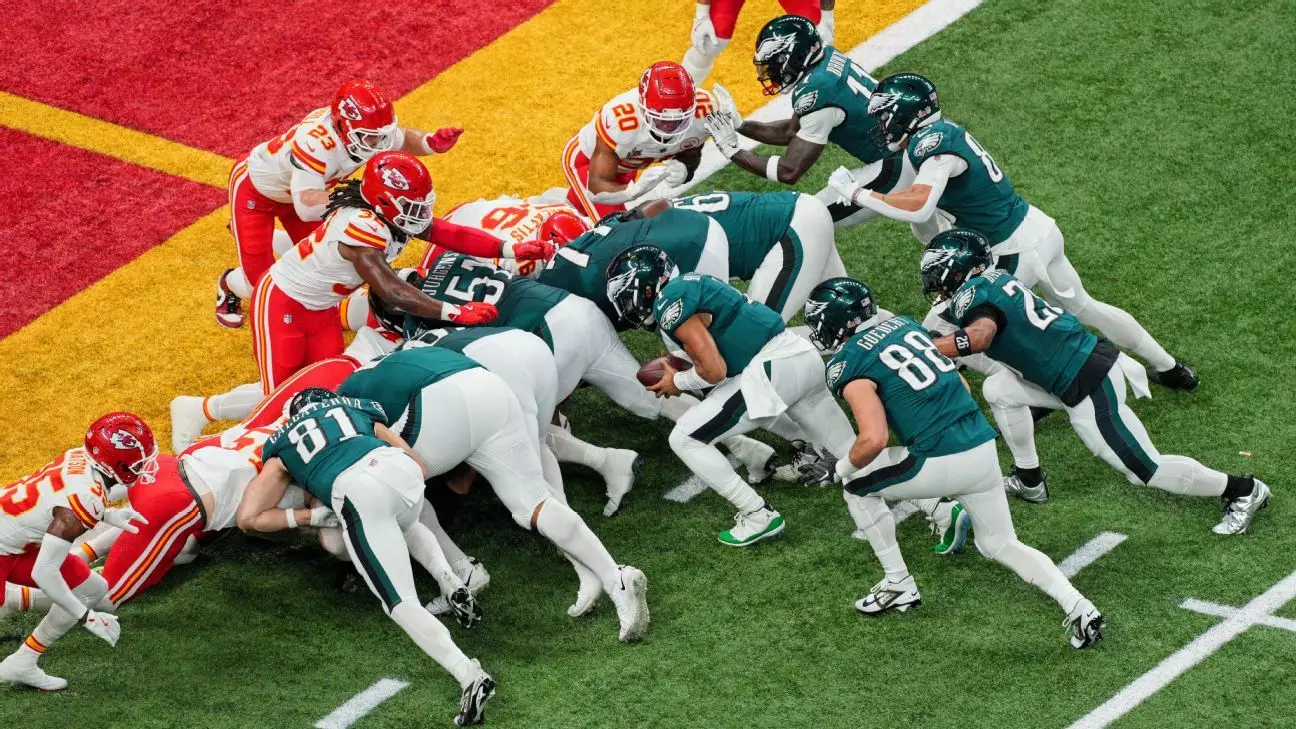In the realm of professional football, the strategies employed can often shape the outcome of a game. One notable tactic that has come under scrutiny is the so-called “tush push,” characterized by a quarterback sneak maneuver that allows a team to advance the football through sheer force. Employing this play, a team positions players behind the quarterback for additional momentum, pushing him forward against the defensive line. Recent developments in the NFL have ignited debates regarding the legality and fairness of this method, leading to a proposal aimed at banning it, revealing the complex dynamics of sports regulation and strategy.
At the recent scouting combine, Troy Vincent, the NFL’s executive vice president of football operations, disclosed that a team had officially submitted a rule proposal aimed at prohibiting the tush push. This revelation highlights an ongoing concern among teams regarding the dominance of this play, especially by franchises like the Philadelphia Eagles and Buffalo Bills. The proposal, albeit lacking the identity of the submitting team, is set for a potential vote among NFL owners next month. For the proposal to pass, it would require a supermajority of 24 votes from the 32 team owners—a challenging threshold that speaks to the contentious nature of rule changes within the sport.
Despite previous discussions surrounding the tush push in past offseasons, no significant amendments have been enacted. The performance of the Eagles and Bills, who have executed the play with spectacular success—achieving a staggering 87% success rate in crucial game situations—has brought the issue to the forefront. In stark contrast, other teams’ attempts have yielded only a 71% success rate, illuminating an apparent disparity that has raised eyebrows across the league.
One of the primary challenges with the tush push is its derivative nature: while it is rooted in traditional football strategies, the collective execution has prompted concerns about player safety and the exploitation of the defensive line. The NFL’s competition committee has historically taken a lenient stance toward innovative gameplay, but the repeated success of this specific play has spurred calls for regulation. Interestingly, the term “Brotherly Shove,” coined in relation to Jalen Hurts and the Eagles’ performances, signifies not only successful execution but also the cultural and emotional connection fans and players have with the sport.
Some coaches, like Nick Sirianni of the Eagles, have openly advocated for maintaining the play, emphasizing that their distinctive execution is not easily replicated across the league. This sentiment suggests a broader debate about how rules should accommodate teams that excel in particular strategies versus the need to maintain competitive balance across the NFL. In many ways, this scenario mirrors discussions around other rule changes that have sparked contention, revealing the delicate balance organizations must navigate between innovation and fairness.
Looking Ahead: Potential Outcomes of the Proposal
As the league anticipates the spring owners’ meeting, the fate of the tush push remains uncertain. Should the proposal to ban the play advance to a vote, it would embody a pivotal moment for football. Proponents of the change argue that the tush push compromises the integrity of defensive strategies, thereby establishing an uneven playing field. Conversely, opponents contend that it reflects the evolution of the game and the tactics available to teams.
Ultimately, the decision to uphold or abolish the tush push will not only shape the future of offensive strategies but also influence how the NFL continues to adapt to changing dynamics, player safety concerns, and the ever-evolving narrative of competitive fairness. As discussions unfold, it is critical for stakeholders to weigh the values of tradition against the realities of modern football, integrating perspectives from coaches, players, and analysts alike. Only time will reveal the outcome of this crucial deliberation and its implications for the future of gameplay in the NFL.

